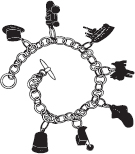8 THE CHARM
BRACELET AND
THE 52 FUNDAMENTAL
ERRORS

So what can you make from an oil cloth, some free paint samples, some beading picked up at a timber yard, some old cardboard and the charms from your wife’s bracelet?
If you were Charles Darrow, you’d create a pastime that your family would know simply as “The Game”.
Now better known as Monopoly, The Game was created by Darrow when he was an unemployed equipment salesman in 1929. The oil-cloth formed his board, coloured and decorated with the paint samples. The beading was cut into pieces and became the original houses and hotels. The charms from his wife’s bracelet were the tokens. The street names were the real street names of Atlantic City, where in better times Darrow had liked to spend his summer with his family. Word about The Game started to spread, and Darrow was soon making first two, then six sets a day. When in 1934 Darrow received his first order from a department store, Wannamaker in Philadelphia, he decided it might be time to expand.
He approached established games company Parker Brothers, but it rejected it, saying that it had: “52 fundamental errors”. Darrow ignored its comments and went on making Monopoly. Sales continued to grow and some 20,000 sets were produced in 1934.
When news of his continued success reached Parker Brothers, the company decided it had been a little hasty in its initial assessment. It offered Darrow a deal that included an attractive royalty for every set sold.
Darrow retired at 46 and died a millionaire aged 78. While it is not confirmed, it’s widely believed he bought his wife another charm bracelet with some of his royalties.
And the moral is that don’t be too proud to admit your mistakes. How can you change a past mistake into a future opportunity?
